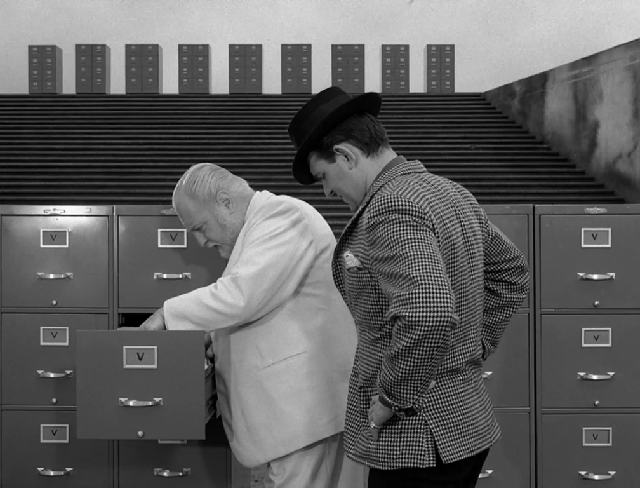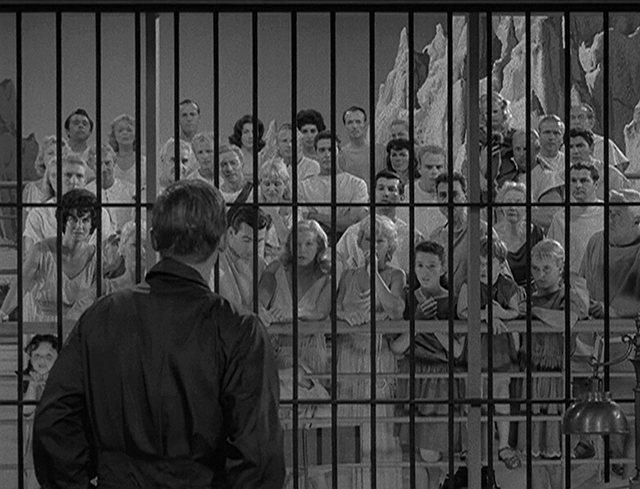Welcome back to Channel Chaser! Recently I’ve been a bit unwilling to commit to starting any new show, so as often happens, I’ve fallen back on re-watching some old favorites of mine. And without a doubt, one of the perennial choices that I can never get tired of seeing is the classic 1950s series The Twilight Zone.
There’s a lot of reasons why The Twilight Zone is so near and dear to my heart, not least of which is because it was one of my first introductions into the genres of fantasy, science fiction, horror, and so many other ideas that it’s hard to keep count of them all. But the most compelling of them is that The Twilight Zone tackles some of the most challenging and uniquely human questions that face us in during our lives: questions of morality, history, duty, psychology, and countless other subjects.
Since The Twilight Zone isn’t really a coherent series with an overarching narrative and is completely made up of separate vignette stories, it’s difficult to review it like I would any other show. To that end, I’ve decided instead to give you some of my favorite episodes and explain why I think they’re the best the show has to offer.
You won’t find classics like “Nightmare at 20,000 Feet”, “The Obsolete Man”, or “Eye of the Beholder” on here–at least, not in every place. The stories that I picked are ones that have resonated with me the most on an emotional and intellectual level throughout the years, and are ones that I felt had the strongest moral lessons that changed the way I looked at both fiction and the real world. So now, without further ado, another journey through that famed land of shadow and substance begins.
Honorable Mention: “What You Need”
This episode is here not because it has a deep moral lesson, but simply because I love the whole idea of it, as well as the twist at the end. The story is one of an old peddler who can seemingly predict exactly what item people will need, no matter how crazy or unlikely it may be. This ability eventually attracts the attention of a young bully who terrorizes the man into helping him win money and avoid accidents. In the end, though, a pair of new shoes leads him to slip in the street and get hit by a passing car. As he lays dying, the old man looks at him sadly and says, “They were what I needed.”
It’s a chilling but fitting reminder that some gifts aren’t meant to be abused, and that bullies always get their comeuppance, but on the other side, it encourages us to appreciate more the things we often take for granted in our lives. You never know when one of them might be the thing that saves your life.
#5: “The Silence”
This episode seems incredibly trivial and silly at first, until the devastating and unexpected ending. A tasteless, chatty airhead is challenged by his country club rival to remain silent for an entire year: a test of the young man’s honor versus the older man’s money. And so the ordeal begins for the young man, trapped in a glass cage wired for sound and observed at all times. Defying all the odds and everyone’s expectations, he doesn’t say a word until he is released twelve months later…only to find that his enemy was lying, and has no money to give. At this, the young man bursts into tears–still silent–and reveals that he had his vocal cords severed so he couldn’t possibly lose: the ultimate gesture in competitive spirit and pride, all for naught.
The warning of this episode is clear: too much competition is a very bad thing, and pride goeth before the fall. But it also clearly demonstrates that no matter how much you may dislike someone, you have no idea of what people are capable of when their backs are against the wall. And if you challenge them, you may get more than you wagered on.
#4: “A Nice Place to Visit”
In this tale, an apparent reversal of fortune lands a dead criminal in a luxurious realm where he has everything he ever wanted: women, money, status, and an ever-present servant named Pip. Confused as to how he made it into Heaven after doing only bad things during his life, he starts to realize that he’s still not happy: he wins at every game, can do whatever he wants with no consequences, and everything is boring and predictable. Desperate, he begs Pip to be taken instead to “the other place,” to which the supposed angel retorts, “Whatever gave you the idea this was Heaven? This is the other place!”
This episode raises some interesting philosophical points. We always imagine Hell as a place of flames, torment, and pitchforks, but what if it’s just a place where sameness eventually drives you crazy for eternity? In my view, the greatest torture in the universe is boredom and loneliness, and the way this story flips the traditional model of the celestial balance on its head is particularly effective.
#3: “A Stop at Willoughby”
What does a man do when he’s unhappy with his drab, dog-eat-dog, constantly moving modern life? He longs for simpler days, of course: in the case of this episode’s main character, that’s an idyllic, pastoral 1800s town called “Willoughby” that he sees as a train stop in his dreams. Seeking to escape from his ambitious, hen-pecking wife and the business world he despises, the man eventually leaps off a train to his death and is carted away to the local funeral home…Willoughby and Son.
Coincidence? Maybe. But message? It’s a double-header from this one. On one hand, the episode very strongly hints that maybe life was better back in the day when things were simpler and the world moved slower. But on the other hand, if the modern man lives his life looking backward instead of forward, he should be ready for the cost of too much nostalgia. The past is gone, and those who seek to relive it only end up disappointed… or worse.
#2: “People are Alike All Over”
Ah, the iconic mission to Mars. It takes on a different spin in this episode, where a two-man team lands in a rocket to explore the Red Planet. With his dying friend encouraging him to open the door to the unknown because “people are alike all over,” a frightened astronaut ventures out to find Martians who look and talk exactly like humans. Feeling more at ease, he is taken to a home specially built for him…only to find it’s actually a cage, and he’s in a Martian zoo because, indeed, people are alike all over: they fear what they don’t understand.
It’s a simple, yet highly effective point. Mankind’s boundless optimism and taste for adventure is our greatest strength, but what if the people we meet out there also shared our greatest weakness? And what would alien beings think of us if they looked at our minds, our history, and could see all the darkest moments of humanity? They’d probably be terrified of us. And they’d be right to be.
#1: “The Monsters are Due on Maple Street”
You had to know that while I promised mostly no standards, my favorite episode is also the critically acclaimed “best of The Twilight Zone” episode. Like the previous choice and many other stories in the series, this one focuses on human frailty: how quickly we turn on those we considered friends and revert to our barbarous animal instincts to kill or be killed when our sense of normalcy and order are disrupted. We watch in horror as the quiet suburban neighborhood of Maple Street becomes a bloodbath as the residents suspect each other of being alien invaders due to intermittent power fluctuations, while all the while the true aliens observe from afar. Their commander notes that in order to conquer humanity, they won’t have to do anything: they’ll just let us destroy ourselves.
There’s a reason why this episode is considered the greatest: it captures the entire essence of The Twilight Zone as a show, depicting human beings at their very best and their very worst, showing how far we’ve come, but how far we still have to go. And maybe, someday, we’ll actually learn something from it.
Channel Chaser is written by Kyle Robertson. You can check out more of his work on his website. Check back every Wednesday for new articles.


